| More Music for Films | |
|---|---|
 | |
| Compilation album by | |
| Released | 2005 |
| Genre | |
| Label | Astralwerks |
| Review scores | |
|---|---|
| Source | Rating |
| AllMusic | |
| Pitchfork | 6.9/10 [2] |
More Music for Films is a compilation album by British musician Brian Eno, released in 2005.
| More Music for Films | |
|---|---|
 | |
| Compilation album by | |
| Released | 2005 |
| Genre | |
| Label | Astralwerks |
| Review scores | |
|---|---|
| Source | Rating |
| AllMusic | |
| Pitchfork | 6.9/10 [2] |
More Music for Films is a compilation album by British musician Brian Eno, released in 2005.
All music is composed by Brian Eno; except where indicated
| No. | Title | Writer(s) | Length |
|---|---|---|---|
| 1. | "Untitled" | 2:05 | |
| 2. | "The Last Door" | 1:31 | |
| 3. | "Chemin de fer" | 1:57 | |
| 4. | "Dark Waters" | 1:07 | |
| 5. | "Fuseli" | 1:40 | |
| 6. | "Melancholy Waltz" | 1:46 | |
| 7. | "Northern Lights" | 2:13 | |
| 8. | "From the Coast" | 2:02 | |
| 9. | "Shell" | 1:26 | |
| 10. | "Empty Landscape" | 1:26 | |
| 11. | "Reactor" | 1:40 | |
| 12. | "The Secret" | 1:13 | |
| 13. | "Don't Look Back" | 0:57 | |
| 14. | "Marseilles" | 1:28 | |
| 15. | "The Dove" | 1:25 | |
| 16. | "Roman Twilight" | 3:38 | |
| 17. | "Dawn, Marshland" | 3:14 | |
| 18. | "Climate Study" | Brian Eno, Daniel Lanois | 3:17 |
| 19. | "Drift Study" | Brian Eno, Roger Eno, Daniel Lanois | 2:33 |
| 20. | "Approaching Taidu" | Brian Eno, Daniel Lanois | 3:36 |
| 21. | "Always Returning (II)" | Brian Eno, Roger Eno | 3:09 |

Roxy Music are an English rock band formed in 1970 by lead vocalist and principal songwriter Bryan Ferry and bassist Graham Simpson. By the time the band recorded their first album in 1972, Ferry and Simpson were joined by saxophonist and oboist Andy Mackay, guitarist Phil Manzanera, drummer Paul Thompson and synthesizer player Brian Eno. Other members over the years include keyboardist and violinist Eddie Jobson and bassist John Gustafson. The band split in 1976, reformed in 1978 and split again in 1983. In 2001, Ferry, Mackay, Manzanera and Thompson reunited for a concert tour and have toured together intermittently ever since, most recently in 2022 to celebrate the 50th anniversary of their first album. Ferry has also frequently enlisted band members as backing musicians during his solo career.
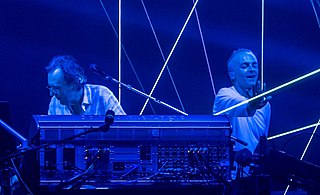
Underworld are a British electronic music group formed in 1987 in Cardiff, Wales and the principal collaborative project of Karl Hyde and Rick Smith. Prominent former members include Darren Emerson, from 1990 to 2000, and Darren Price, as part of the live band from 2005 to 2016.

Another Green World is the third solo studio album by Brian Eno, released by Island Records on November 14, 1975. The album marked a transition from the rock-based music of Eno's previous releases toward the minimalist instrumentals of his late 1970s ambient work. Only five of its fourteen tracks feature vocals, a great contrast to his past pop music material, which predominantly featured vocals in their recordings.
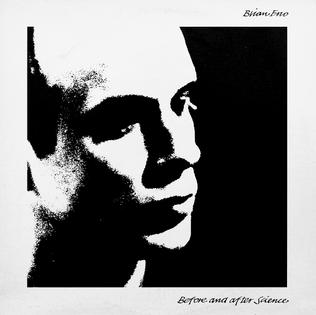
Before and After Science is the fifth solo studio album by Brian Eno, originally released by Polydor Records in December 1977 in the United Kingdom and by Island U.S. soon after. Produced by Eno and Rhett Davies, it is the first of Eno's popular music works to be published under his full name.

Ambient 1: Music for Airports is the sixth studio album by Brian Eno, released in March 1978 by Polydor Records. It is the first of Eno's albums released under the label of ambient music, a genre of music intended to "induce calm and a space to think" while remaining "as ignorable as it is interesting". While not Eno's earliest entry in the style, it is credited with coining the term.
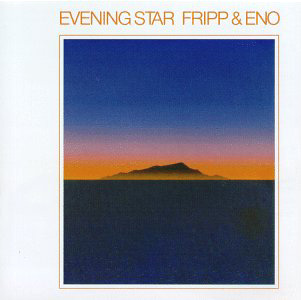
Evening Star is the second studio album by British musicians Robert Fripp and Brian Eno. It was recorded from 1974 to 1975 and released in December 1975 by Island Records.
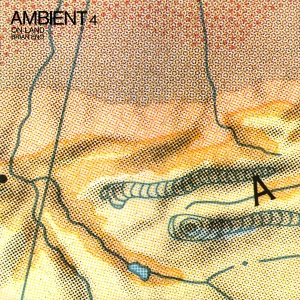
Ambient 4: On Land is the eighth solo studio album by Brian Eno, released in March 1982 by EG Records. It was the final edition in Eno's ambient series, which began in 1978 with the release of Ambient 1: Music for Airports. The album was released to critical acclaim, and is, along with the rest of the ambient series, recognised as a landmark album in the history of the ambient music genre.

Apollo: Atmospheres and Soundtracks is a studio album by the British musician and producer Brian Eno, the Canadian producer Daniel Lanois, and Brian Eno's brother, composer Roger Eno. It was released on 29 July 1983 by EG Records. The music was originally written for For All Mankind, a documentary film by Al Reinert about the Apollo program, though the film was not released until 1989. The score was written and performed by the trio.

Thursday Afternoon is the tenth solo studio album by Brian Eno, released in October 1985 on EG Records. Consisting of one 60-minute eponymous composition, it is the rearranged soundtrack to an 80-minute video production of the same title made in 1984.

Here Come the Warm Jets is the debut solo album by Brian Eno, released on Island Records on February 8, 1974. It was recorded and produced by Eno following his departure from Roxy Music, and blends glam and pop stylings with avant-garde approaches. The album features numerous guests, including several of Eno's former Roxy Music bandmates along with members of Hawkwind, Matching Mole, Pink Fairies, Sharks, Sweetfeed, and King Crimson. Eno devised unusual methods and instructions to coax unexpected results from the various musicians.
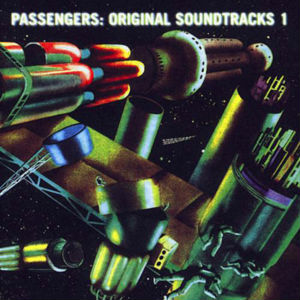
Original Soundtracks 1 is a studio album recorded by rock band U2 and Brian Eno under the pseudonym Passengers as a side project. Released on 6 November 1995, the album is a collection of songs written for mostly imaginary films. Owing to Eno's involvement as a full songwriting partner and the album's experimental nature, the moniker "Passengers" was chosen to distinguish it from U2's conventional albums. It was commercially unnoticed by the band's standards and received generally mixed reviews. Guest musicians on the record included Italian opera singer Luciano Pavarotti and producer Howie B, who would co-produce U2's following album, Pop (1997).

Music for Films is the seventh solo studio album by Brian Eno, released in September 1978 on EG Records. His third release of experimental electronic material, it is a conceptual work intended as a soundtrack for imaginary films, although many of the pieces had already appeared in actual films. It charted at #55 on the UK.

A Reality Tour is a DVD released in 2004 of David Bowie's performance at Point Theatre in Dublin, Ireland in 2003 during the A Reality Tour.

Music for Films III is the third entry in Brian Eno's "Music for Films" series. Unlike entries in the past, this record features tracks credited to Brian Eno, Roger Eno, Michael Brook, and Harold Budd among others, with Brian Eno involved with the production of all tracks.
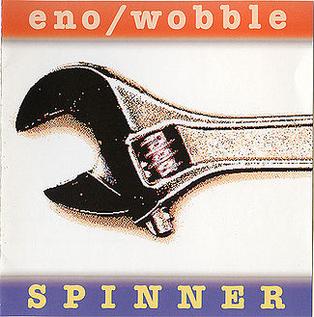
Spinner is an instrumental album by British musicians Brian Eno and Jah Wobble, released in 1995.

The Million Dollar Hotel: Music from the Motion Picture is the soundtrack to the 2000 film The Million Dollar Hotel. The album was released alongside the film in March 2000, and featured Bono as its executive producer, with new music from U2 and other artists.

Brian Peter George St John le Baptiste de la Salle Eno, also known by the mononym Eno, is an English musician, composer, record producer and visual artist. He is best known for his pioneering contributions to the ambient music and electronic genres, and for producing, recording, and writing works in rock, artistic pop and minimalist drone music. A self-described "non-musician", Eno has helped introduce unconventional concepts and approaches to contemporary music. He has been described as one of popular music's most influential and innovative figures. In 2019, he was inducted into the Rock and Roll Hall of Fame as a member of Roxy Music.
"Slug" is a song by Passengers, a side project of rock band U2 and musician Brian Eno. It is the second track on Passengers' only release, the 1995 album Original Soundtracks 1. The track was originally titled "Seibu" and was almost left off the album before it was rediscovered later during the recording sessions. Though Eno made most of the creative decisions during the recording sessions, "Slug" was one of the few tracks that the members from U2 tried to craft themselves.

(No Pussyfooting) is the debut studio album by the British duo Fripp & Eno, released in 1973. (No Pussyfooting) was the first of three major collaborations between the musicians, growing out of Brian Eno's early tape delay looping experiments and Robert Fripp's "Frippertronics" electric guitar technique.
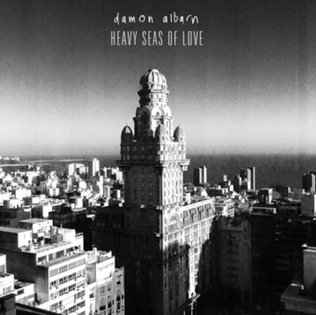
"Heavy Seas of Love" is the fifth single by Damon Albarn, from his solo debut album, Everyday Robots. It was released as a single in digital formats on 27 April 2014, via Warner Bros. Records in the US. The song features Brian Eno and The Leytonstone City Mission Choir.